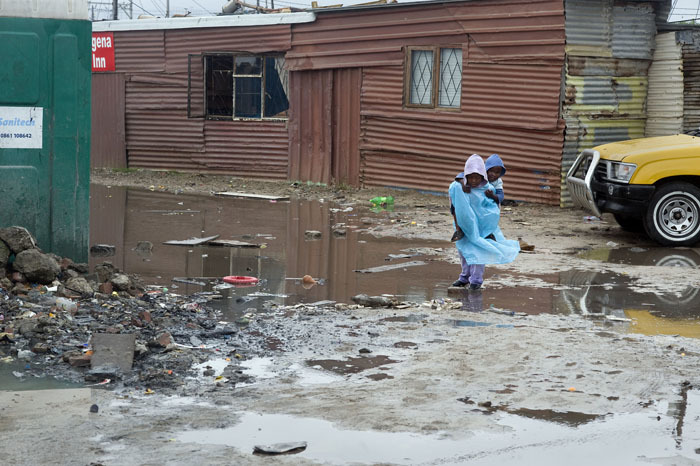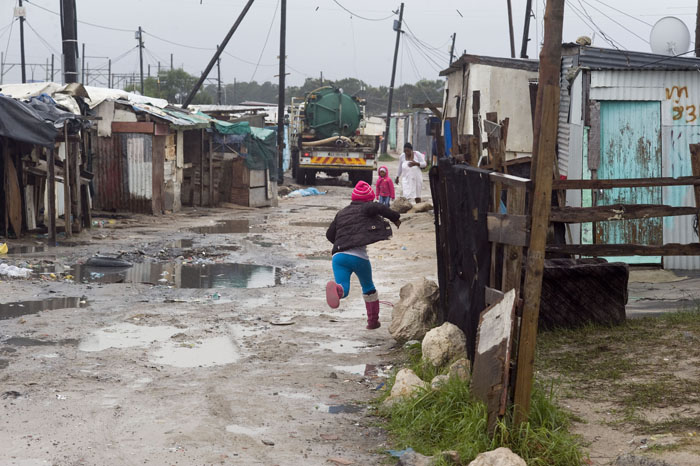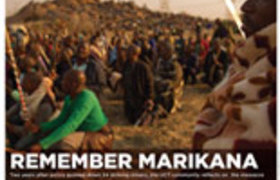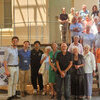Climate change: A developmental issue
25 February 2015
Dr Gina Ziervogel says we could and should be doing more to protect vulnerable communities from the effects of climate change, such as those living in Khayelitsha, a Cape Town township that floods every year during the rainy season.
The floodgates open
South Africa could be doing more to mitigate the impact of climate change on the country's poorest and most vulnerable people, says Dr Gina Ziervogel.
"In the city of Cape Town, for example, flood risk is extremely high in informal settlements, and I don't think that has been prioritised sufficiently; whereas in coastal areas that are at risk of storm surge and sea-level rise, there's been a lot of focus – because there's a lot of money," says Ziervogel, a senior lecturer in the Department of Environmental and Geographical Science.
Households on the Cape Flats are flooded every year, posing health risks and harming businesses. "One of the things that's really important with increasing climate risks is reducing the disaster risk; and we'd argue that unfortunately, because of the circumstances, we tend to be reactive and try and react to flood risk – not enough is being done to reduce flood risk, to ensure that it doesn't happen in the future."
Combating climate change should be a priority
Concern about climate change is growing, says Ziervogel. While it's a complex task to prove that climate change is behind instances of severe flooding, for example, Ziervogel says that most of the people she has spoken to in the course of her research speak of changes in rainfall and seasons, which she believes are mirrored in the data.
"I think municipalities and individuals have experienced the impact of climate change and large climate events or shifts in the seasons," she says.
"But I think we've still got a long way to go in terms of getting really mainstream buy-in that this is a priority. My feeling is that really, [even] in a country like South Africa where there are so many development challenges, responding to climate change should be a priority, because climate risks impact on development progress.
"Housing, water, food are all impacted by climate; and if we don't adapt now, we're actually undermining our capacity to respond in the future," says Ziervogel. "So I think it's really critical to portray it as a development issue so that it gets the buy-in it needs from a broader group of people, so that we can move forward on this."
Ziervogel says that there are examples of communities banding together to mitigate climate change. For example, rooibos farmers in Nieuwoudtville, about four hours outside Cape Town, are working with an NGO to find ways to adapt to climate change and reduce the risks brought on by increasing temperatures.
 An informal settlement
An informal settlement
Lean years ahead?
So how real and present a danger does global warming pose to food security?
This is a core research question for Professor Stephanie Midgley of the African Climate and Development Initiative.
First, how certain are climate scientists that the earth is in fact getting hotter?
"The current evidence is that we know for certain – there's no doubt about it – that temperatures are rising significantly. Certainly in the Western Cape the weather stations have shown quite clearly that there is significant warming. Not just the average warming, but also the heat side. So you get exceptionally hot days," says Midgley.
This is already having an impact on agriculture.
"Rooibos, for example, is a dry-land crop, meaning that it's not irrigated; and the farmers are very dependent on when the first rain comes in autumn, because they need that winter rainfall," she says. "The plants are adapted to that winter rainfall and the dry summers, but if the rain comes too late or it's too little, then those crops are at risk.
"And the farmers in the northern part of the Cederberg are already starting to see that it's changing. They see the impact on their yield and quality very quickly when they have a very dry or an extremely hot year."
Farmers who can afford to move to areas with the right temperature for their produce, and this trend has been seen in the wine-grape industry, too.
"But smallholders in the Cederberg, for example, don't have the resources to move around and are most vulnerable to the effects of climate change," she says.
Will food become unaffordable?
As some commodities become scarcer, prices could go up, says Midgley. There's a real concern that poor people will be priced out of nutritious food, she adds. "Our food system is very closely linked with the global food system. There's a huge trade in food going on across the world, and South Africa is very much part of the global food system."
A lot of South Africa's food prices are determined by global markets – for example, the wheat exchange.
"There is a danger – not just in South Africa, but globally – that climate change could make production more challenging, more variable; so you'll have more incidences of massive drought in South America – or South Africa, for that matter. That impacts what's available; and of course, prices go up.
"That has a huge impact on poorer people. We saw that a few years ago, when there were food riots in some of our neighbouring countries because the prices spiked quickly."
Mid-century, the predictions for agriculture in South Africa are fairly serious, says Midgley. There might be cooler areas where warming of one or two degrees Celsius could boost agriculture.
"But once you get over two degrees and you move to three degrees – that's where your thresholds are, globally – then you'll see global production coming down dramatically. In Africa the projection is that you can probably handle one degree, and then you're going to start getting those major impacts.
"We're not going downhill yet, but we need to be aware of the fact that it's not going to take a lot more to start going downhill."
Story by Yusuf Omar. Photos by Rodger Bosch.
 This work is licensed under a Creative Commons Attribution-NoDerivatives 4.0 International License.
This work is licensed under a Creative Commons Attribution-NoDerivatives 4.0 International License.
Please view the republishing articles page for more information.
News
Photo Essay
Feature
Front page
Previous Editions










